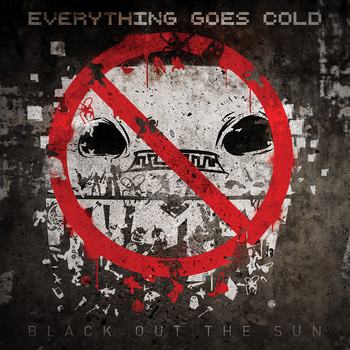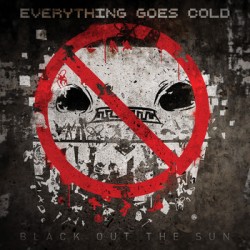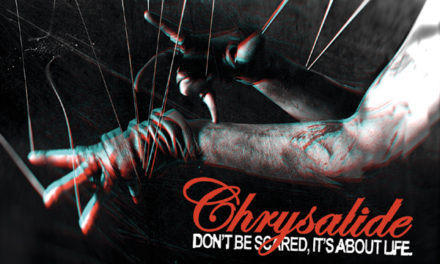In Conversation is a feature in which the senior staff talk about a record we’ve been listening to. Not exactly a review, it’s pretty much exactly what it says on the tin: two music nerds having a conversation about an album with all the tangential nonsense, philosophical wanking, and hopefully insightful commentary that implies. Follow us down the rabbithole as we dissect the new album from an established industrial rock auteur who is seriously making a case for himself in the grander scheme of Our Thing…
Everything Goes Cold
Black Out The Sun
Metropolis Records
Alex: We spoke to Eric from Everything Goes Cold for the podcast the other week, and as I listen to the new album Black Out The Sun now one thing keeps coming back to me from that conversation; specifically the part where Eric said straight out that he considers himself an industrial musician and isn’t too interested in debating what that means or where his band falls into that spectrum of music. That’s interesting to me for a number of reasons, but specifically because while the record is very “scene” in terms of pedigree, it also has a much broader palette than I think most people associate with industrial rock as a genre. Like EGC sort fall under that umbrella by dint of guitars, but I don’t hear a lot of the classic acts who get tagged with that genre, or the American coldwave offshoot that Eric is a historian of.
That’s sort of a roundabout way of saying that Gottesman’s songwriting and production choices feel very appropriate for what he’s doing, but very distinct from what he’s done before. I suppose it’s not a big shock to hear lots of chiptune sounds on it, but when you hear them integrated so fully into what plays as an inspirational anthem on “When the Sky Rips in Two You Are Free” it feels very natural. So yeah, I’m honestly very taken with how Eric has taken sounds and ideas that could come off as gimmicky or unsubtle and used them in really clever and articulate ways. It’s especially appropriate given our oft-discussed theory of Everything Goes Cold, that the strength of the project is in suggesting fantastical narratives that are actually about really relatable feelings.
Bruce: That’s especially relevant given Eric’s love for “classic” coldwave, to the point of sanguinely nodding to it in the band’s name. I’m sure we’ll talk more about the change in thematic tones Black Out The Sun also heralds, but for the task at hand, yeah, this feels like material which Eric was able to organically connect to a bunch of genres and stylistic markers which blend well with coldwave, but which wouldn’t necessarily come immediately to mind. This feels like the first EGC release which I could recommend to someone with no more than a “hey, you like industrial, right?” pitch, rather than going into a detailed preface: “Okay, so there’s this particular strain of American industrial rock, and also there are these comic books where…” That isn’t to say that Black Out The Sun doesn’t contain the thematic idiosyncrasies which we’ve come to love and expect from EGC (see the Filmation sample which kicks off “The Joke”), just that they’re nestled within a wider array of sounds.
Overall I find those broader musical moves help to underscore the themes he’s working with. They either feel more widely applicable, or, as in the case of the chiptune stuff, they possess a nuance which would be hard to detect if this was just “the coldwaviest album that ever waved at the cold”. Whether it’s the slightly wary chiptune into to “When The Sky Rips In Two” or the string pads of “Ice Brigade, Part II”, I feel like we’re being invited to interpret these narratives either somewhat skeptically, or to imagine how they might apply to unexpected scenarios (see the revelation that the former track actually owes its genesis to C. Montgomery Burns which Eric just dropped on us). I have my own read on the manifestos and rallying cries which dot the record, but I’m keen to hear how you’re interpreting the rhetoric of supervillainy on this EGC record, perhaps especially since you’re more privy to any and all comic book connections than I.
Alex: Well, it’s important to note that a close examination of the lyrics of the album doesn’t really reveal a narrative, so I don’t want people to get the impression this is a literal concept record, at least not as far as I can tell anyway. With that understanding, I actually feel like these songs are about a villain accepting their role as antagonist. Like, the first song with lyrics is “The Joke” (which has a pretty tasty Killing Joke pastiche built into it appropriately enough) the idea of which seems to be that the irony of wasting your life trying to destroy someone else’s. Contrast that with the closing track “Conqueror”, where the message seems to be an apology of sorts for not following through and robbing some unnamed hero of the opportunity to be heroic and fulfill their destiny. I really like that idea, the self-actualization and eventual downfall of some meta-antagonist as viewed through their own eyes, and even minus a literal storyline you can sort of watch the whole thing play out with a kind of sad inevitability.
I almost want to liken Black Out the Sun to Breaking Bad (or on a slightly more outré tip, Biggie’s Life After Death), in that it’s the story of an unapologetic bad guy who is self-aware enough to understand their own failings while being unable to escape them. I’m a huge sucker for the truism that we’re all our own worst enemy, and the more I think about it, the more the concepts of self-defeat are built into the album; check the themes apparent in the chorus of “IAMERROR” for a good example. Eric writes really evocative lyrics which are still somewhat open to interpretation, so I’m super curious how much my take jibes with your read on the album.
Bruce: I’d generally agree with that, although I’m also interested in how things look when you take the album’s power trips with a grain of salt: “the end has come and I’m the destroyer” is of course a self-damning phrase but it’s also a self-affirming one. American industrial music, including coldwave, has often concerned itself with conveying feelings of depression or worthlessness. There’s nothing insignificant or worthless about the narrators of Black Out The Sun striving to “reclaim [their] destiny”, quite the opposite. But can we take them at their word? Is the rhetoric of “cartoonish supervillainy” in fact a feint?
Popular cribbings of Nietzsche often his boil his work down to the idea that if one frees oneself from the chains of inherited morality, one gains the potential to become something greater than human. Ever since then, culture and literature have been populated by litanies of would-be ubermenschen, many of whom fail utterly in their ambitions, and in said process realise just how pitiful their actual state is, outside of their own fantasies in which they are the harbingers of a new age. Dostoevsky’s Raskolnikov predates Nietzsche, but is a great anachronistic example. The paranoid narrator of Robert W. Chambers’ “The Repairer Of Reputations” shows how compelling the fantasy life of the delusional would-be Napoleon can be even when juxtaposed with the banalities of the real world (something True Detective tapped well in referencing Chambers), and I wonder if in a sense that’s part of the appeal of Black Out The Sun: that we can adopt the position of the eater of worlds, the leader of the robot uprising, or the heirophant of Nyarlathotep, when in actuality you and I are a couple of schlubs listening to our noisy industrial music on our headphones on the way to work. Are the narrators of “Crawl Of The Nameless Beast” and “Conqueror” similarly deluded?
I don’t want to sound like I’m criticizing Black Out The Sun in asking these questions; on the contrary, I love that there’s an album that’s this developed, that raises so many thematic and emotional questions instead of just accepting the wreaking of inter-dimensional vengeance prima facie (though I love Bal-Sagoth for doing just that), while still bringing a great clutch of songs. To bring the discussion back to the music itself in closer detail, what in particular’s cinching this clutch of songs for you as a great record (ie, not just “the best EGC release yet”, which I know we’re in agreement about)?
Alex: Well, if we’re talking albumcraft I think Black Out the Sun is structured really well for listening all the way through. I latched onto the “IAMERROR”, “Serpent Crown” and “When the Sky Rips in Two” sequence on my first pass and listened to it on repeat a bunch before really letting the rest of the record sink in. That’s kind of notable, in that the middle of the album is as strong if not stronger than the beginning and the end where the killer tracks usually get positioned.
Once I did a few back to front passes I realized this is actually what I like to think of as a chain-smoking record: each song is lit from the embers previous one and is there to spark the song that follows. When I hear the sad closing melody of “SL.R1S” give way to the pounding drums on “The Joke” it actually feels like it means something to have those tracks placed next to one another, like beyond them sounding okay that way. Ditto for how “All Sculpt Evil From Clay Beneath Their Lips”‘ coda blends into the beginning of “Conqueror” to finish things off. I like it when a record feels like it’s a designed listening experience, and that’s certainly the case here.
Musically, if you put this album next to Vs. General Failure it’s a whole different animal. Now admittedly there’s almost five years between them, so that shouldn’t be a surprise, but it’s still worth making mention of. Eric has spoken about Pop Will Eat Itself being an influence and I’d cosign that as a useful touchstone. Check the way these songs are built to allow different elements to duck in and out discretely, so even a sudden blast of guitar or a recognizable sample can fit into the mix naturally, just like the best Poppies songs were able to manage. Hell, I’ll go one further and compare the level-up from the last EGC record to the jump between PWEI’s The Looks Or The Lifestyle? and Dos Dedos Mis Amigos, the sound of a band known for being fun and doing pisstakes exploding out into a much bigger world of ideas and emotions. It’s super hacky (and I think misleading) to label this “the serious EGC record”, but it does have a lot more depth to it than even I as a fan was expecting.
Bruce: Yeah, Eric’s comment about PWEI definitely makes sense and I like your point about continuity. I’ve sometimes misremembered which lyrics or passages are found in which song, but that’s not because they all sound the same, but rather because each tune hands the baton off so seamlessly to the next. I’ve noticed a slight bump in the “the album is dead” meme in mainstream music writing of late, though there’s nothing new about that trope. While I’m loathe to compare general music trends to what’s happening in Our Thing simply because the scope and stakes are so much smaller, I think it’s pretty incredible that two acts often (unfairly) regarded as comedy bands first and foremost (EGC and Alter Der Ruine) released albums on the same day which not only show their skill at working in a more “serious” tone, but also show a huge leap in their mastery of albumcraft. Like I alluded to at the beginning, Black Out The Sun doesn’t need much prefacing, but as we’ve found out in short order, it’s definitely something that requires no small amount of consideration. Highly recommended.







You described the themes of the album really well. Having only listened to the “Tyrant Sun” EP before, I didn’t expect this album to have such a deeply tragic feeling. Probably my favourite album this year so far.
Took me a while to warm up to the chiptune elements, but this has ended being my my most-listened to retrospective favorite album of 2014.